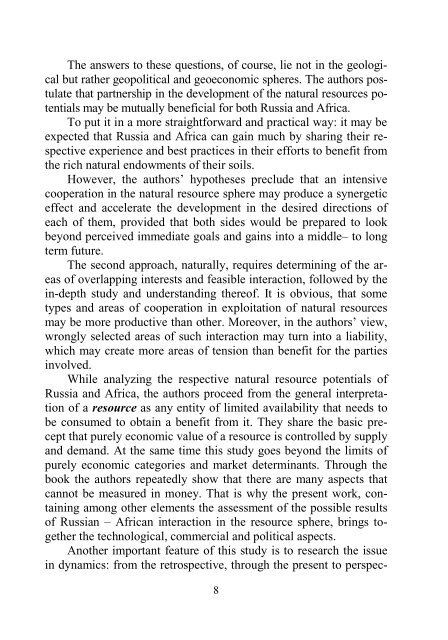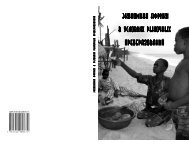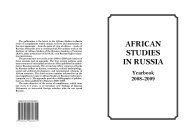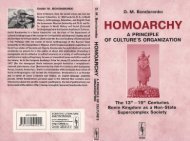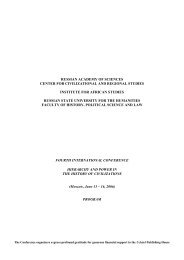L. Fituni, I. Abramova Resource Potential of Africa and Russia's ...
L. Fituni, I. Abramova Resource Potential of Africa and Russia's ...
L. Fituni, I. Abramova Resource Potential of Africa and Russia's ...
Create successful ePaper yourself
Turn your PDF publications into a flip-book with our unique Google optimized e-Paper software.
The answers to these questions, <strong>of</strong> course, lie not in the geological<br />
but rather geopolitical <strong>and</strong> geoeconomic spheres. The authors postulate<br />
that partnership in the development <strong>of</strong> the natural resources potentials<br />
may be mutually beneficial for both Russia <strong>and</strong> <strong>Africa</strong>.<br />
To put it in a more straightforward <strong>and</strong> practical way: it may be<br />
expected that Russia <strong>and</strong> <strong>Africa</strong> can gain much by sharing their respective<br />
experience <strong>and</strong> best practices in their efforts to benefit from<br />
the rich natural endowments <strong>of</strong> their soils.<br />
However, the authors’ hypotheses preclude that an intensive<br />
cooperation in the natural resource sphere may produce a synergetic<br />
effect <strong>and</strong> accelerate the development in the desired directions <strong>of</strong><br />
each <strong>of</strong> them, provided that both sides would be prepared to look<br />
beyond perceived immediate goals <strong>and</strong> gains into a middle– to long<br />
term future.<br />
The second approach, naturally, requires determining <strong>of</strong> the areas<br />
<strong>of</strong> overlapping interests <strong>and</strong> feasible interaction, followed by the<br />
in-depth study <strong>and</strong> underst<strong>and</strong>ing there<strong>of</strong>. It is obvious, that some<br />
types <strong>and</strong> areas <strong>of</strong> cooperation in exploitation <strong>of</strong> natural resources<br />
may be more productive than other. Moreover, in the authors’ view,<br />
wrongly selected areas <strong>of</strong> such interaction may turn into a liability,<br />
which may create more areas <strong>of</strong> tension than benefit for the parties<br />
involved.<br />
While analyzing the respective natural resource potentials <strong>of</strong><br />
Russia <strong>and</strong> <strong>Africa</strong>, the authors proceed from the general interpretation<br />
<strong>of</strong> a resource as any entity <strong>of</strong> limited availability that needs to<br />
be consumed to obtain a benefit from it. They share the basic precept<br />
that purely economic value <strong>of</strong> a resource is controlled by supply<br />
<strong>and</strong> dem<strong>and</strong>. At the same time this study goes beyond the limits <strong>of</strong><br />
purely economic categories <strong>and</strong> market determinants. Through the<br />
book the authors repeatedly show that there are many aspects that<br />
cannot be measured in money. That is why the present work, containing<br />
among other elements the assessment <strong>of</strong> the possible results<br />
<strong>of</strong> Russian – <strong>Africa</strong>n interaction in the resource sphere, brings together<br />
the technological, commercial <strong>and</strong> political aspects.<br />
Another important feature <strong>of</strong> this study is to research the issue<br />
in dynamics: from the retrospective, through the present to perspec-<br />
8


